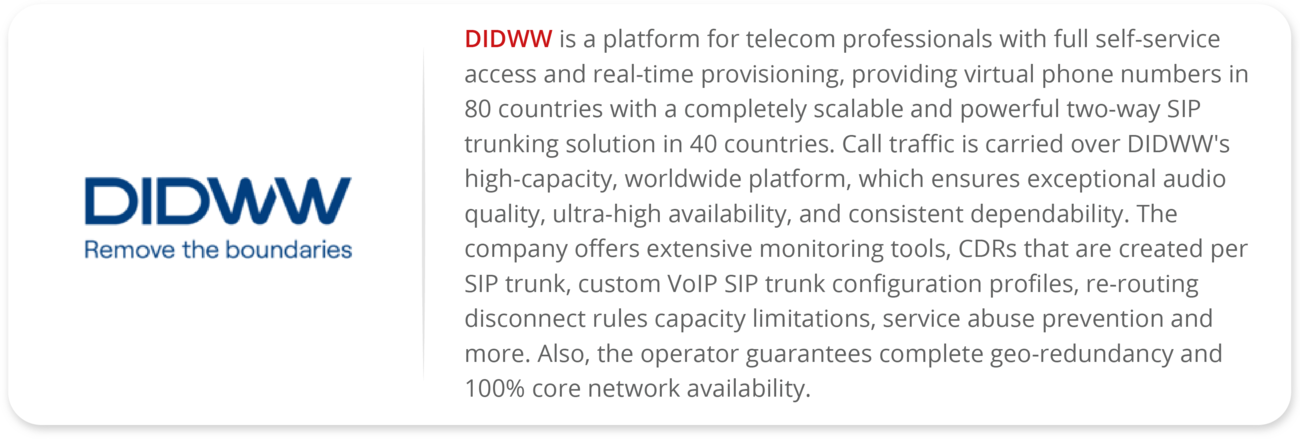SIP trunking is conquering the business world. However, some still do not know exactly what SIP services are, how they work or what to expect from them. We want to explain some essential aspects of this service, so in this article we will examine what SIP trunking is, what its benefits are and introduce you to the most popular SIP trunking providers on the market.
SIP Trunking definition
SIP or Session Initiation Protocol is a way to carry through voice over IP (VoIP) calls. It is an application layer protocol for real-time audio and/or video sessions between two endpoints. To put it simply, SIP is a technology that originates, maintains, modifies, and terminates call sessions over an IP network.
Basically, SIP trunks are the virtual version of analog telephone lines. When using SIP trunks, a SIP provider connects one or multiple channels to a Private Branch Exchange (PBX), giving users the ability to make local, long distance, and international calls over the Internet. SIP trunks use a packet switch network in which voice calls are broken down into digital packets and sent over the network to its final destination.
Each SIP trunk supports SIP channels. A SIP channel is analogous to a single incoming or outgoing call. A SIP trunk can have an unlimited number of channels, therefore a business needs only one, no matter the amount of calls the users expect at once. With SIP trunking users can purchase exactly the number of channels needed. Unlike with traditional PSTN-based telephony or PRI (Primary Rate Interface) implementations. They were connected with copper wires to expensive hardware-based PBX systems, where channels needed to be purchased in bundles and businesses often ended up paying for capacity they never used.
What are SIP Trunking benefits?
The biggest advantage of using SIP trunking is that it is cost-effective. This is for many reasons; one is that it eliminates the cost of long-distance calling. Secondly, SIP trunks and SIP channels are deployed depending on the actual use of the service. This is especially important for businesses with a lot of calls, such as call centers and large sales teams.
Furthermore, SIP trunking is flexible and easy to scale. It allows an unlimited number of channels per trunk and requires no physical installation or setup. Meaning no maintenance or hardware costs. And new channels can be added and activated in a matter of hours.
In addition to the cost benefits, businesses will get the advantage of cloud features. SIP trunks come with integrated disaster recovery scenarios and alternative routing. With IP phone services, the system is secure from extreme weather conditions or natural disasters.
Call clarity and reliability is one of the main concerns when using the Internet for making calls. However, you can get excellent call quality with a reliable Internet connection and the right telecom operator. In most cases, the quality of SIP calls will be better than the traditional on-premises ones. The ability to apply and update codec and adjust bandwidth ensures that voice quality is always crystal clear.
On top of that, SIP trunks remove telecom-related location-based restrictions, which means users can acquire any number, regardless of location. Also, SIP trunks are not attached to a location. This means that businesses can move offices without having to change phone numbers.
SIP creates a unified virtual presence. SIP trunking allows businesses to use the same IP-based network for different types of data transmission, such as voice, video, ect. Therefore, there is no longer a need to use multiple voice integrations. All your real-time communications are managed from a single place. Plus, SIP trunking and VoIP save time by providing an administration portal panel for self management, including call forwarding adjustments, assigning or changing extensions, and adding phone lines as needed.
In addition, SIP trunking is a useful transitional technology that allows businesses to take advantage of enhanced communications services while leveraging existing investments in on-premises equipment.
Which SIP trunking provider to choose?
Choosing the ideal SIP provider for your company may have an influence on all fundamental processes of your business. Your SIP service may affect the quality of your conversations, the sorts of customer care you can provide, and even the effectiveness of your marketing initiatives, so it is critical to pick intelligently.
Upgrading to SIP trunks might be one of the wisest moves you could make for your company today. Ideally, you want to choose an experienced supplier who can assist you through the procedure easily while recognizing and eliminating any challenges that may arise.
To make the choosing process a little easier, here is a list of SIP providers in an alphabetical order.












Missing a provider? Let us know about it at [email protected]







